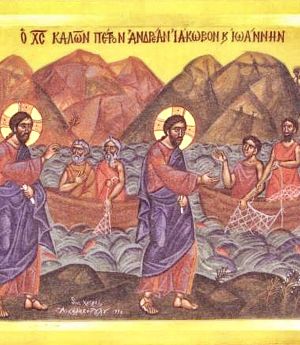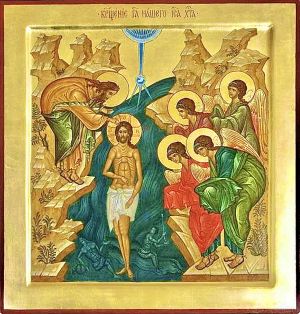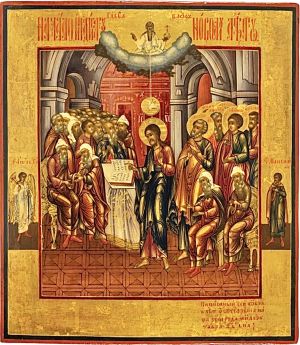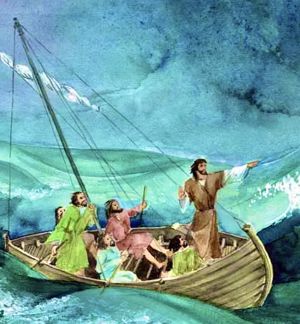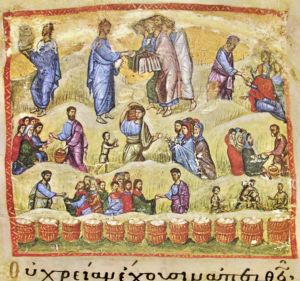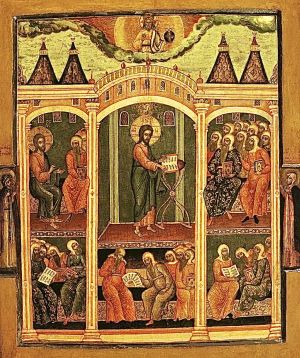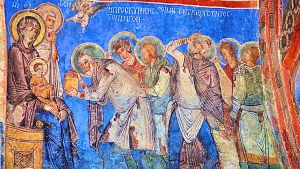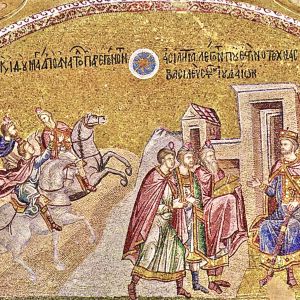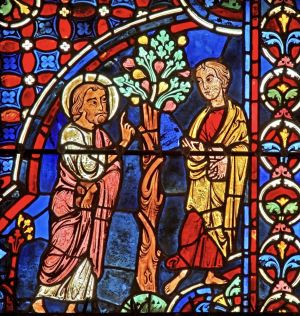
Teresa Girolami
Teresa Girolami è laureata in Materie letterarie e Teologia. Ha pubblicato vari testi, fra cui: "Pellegrinaggio del cuore" (Ed. Piemme); "I Fiammiferi di Maria - La Madre di Dio in prosa e poesia"; "Tenerezza Scalza - Natura di donna"; co-autrice di "Dialogo e Solstizio".
«Know your calling well»
Jesus, during his preaching and passing by the Sea of Galilee, calls to his retinue the first four disciples who, having left their nets, are about to become involved in the Gospel adventure for the Kingdom.
Francis feels the call to become a "fisherman" of men from the very beginning of his evangelical parable.
"Francis, who, never trusting in himself, sought inspiration from God in prayer in every decision, chose to live not for himself alone, but for Him who died for all, well aware that he had been sent by God to conquer the souls that the devil was trying to kidnap" (FF 381).
The explicit call that Christ had addressed to him had induced him to leave the nets of worldly life to become a herald of the Truth of the Gospel.
"In the church of the Virgin Mother of God dwelt, therefore, his servant Francis and insistently begged with continual groans She who conceived the Word full of grace and truth, that She might deign to become his advocate. And the Mother of mercy obtained by her merits that he himself conceived and gave birth to the spirit of gospel truth.
As he devoutly listened one day to the Apostles' Mass, he heard the Gospel passage recited in which Christ, sending the disciples to preach, gives them the Gospel way of life, saying:
"Keep neither gold nor silver nor money in your belts; have no travelling bag, nor two tunics, nor shoes, nor staff."
This he heard, understood, and committed to memory the friend of apostolic poverty, and immediately, filled with unspeakable joy, he exclaimed: "This is what I desire, this is what I yearn for with all my heart!"
He took off his shoes from his feet; he left his staff; he cursed his saddlebags and money and, content with only one little cassock, he threw away his belt and replaced it with a rope and put all his concern into discovering how to fully realise the words he had heard and to adapt himself in everything to the rule of holiness, dictated by the apostles" (FF 1051).
"From that moment the man of God, by divine incitement, devoted himself to emulating evangelical perfection and inviting all others to penance" (FF 1052).
Clare, as a little plant of the Seraphic Father, in her extraordinary Testament says:
"Among the other benefits, which we have received and every day receive from our Donor, the Father of mercies, for which we are greatly obliged to render to Him glorious living graces, great is that of our vocation.
And the greater and more perfect it is, the more we are obliged to him.
Therefore the Apostle admonishes: Know your vocation well" (FF 2823).
Monday 1st wk. in O.T. (Mk 1,14-20)
Divine satisfaction and fulfilment of all justice
Today, in the Gospel of Matthew, we hear about the baptism of the Lord.
To John, who feels uncomfortable because he knows that he needs to be baptised by the Son of God, Jesus replies that it is good to let all justice be fulfilled.
In the Sources concerning the birth and baptism of Francis, we read:
"Francis, servant and friend of the Most High, was given this name by divine Providence, so that the fame of his mission might more easily spread throughout the world because of its originality and novelty.
His mother had named him John, but when he was reborn of water and the Holy Spirit, he became a son of grace instead of a son of wrath" (FF 583).
The Sources also reveal wonderful things about Clare of Assisi, born to Madonna Ortolana.
In the Legend: "The tree is known by its fruit, and the fruit derives its value from the tree.
The abundance of divine Grace poured out in advance into the root, so that holiness might flourish copiously in the branch.
Finally, as the pregnant woman was about to give birth, she prayed intensely to the Crucifix in the church, before the cross, to save her from the dangers of childbirth, and she heard a voice saying to her:
'Do not be afraid, woman, for you will give birth safely to a light that will add brightness to the light itself'.
Enlightened by this prophecy, she wanted the newborn, reborn at the baptismal font, to be called Chiara, hoping that the promised clarity of light would somehow be realised later, in accordance with the loving plan of the divine will.
The Holy Spirit, symbolised by the dove and mentioned in the Gospel, filled Francis with his power and guided him throughout his life as the "Manifestator" of the Son of God:
"The Spirit of the Lord, who had anointed and sent him, assisted his servant Francis wherever he went; Christ himself, the power and wisdom of God, assisted him [...]
His words were like a burning fire, penetrating the depths of the heart and filling minds with admiration" (FF 1210).
And Clare herself, animated by the Holy Spirit poured out upon her in abundance, "was the new woman of the Spoleto valley who opened a new source of living water for the refreshment and well-being of souls" (FF 3294).
Through his prophets, the Lord manifests the revolution wrought by the Spirit, who makes us children of divine favour and intrepid witnesses of his saving Word.
«Now, having been immersed, Jesus immediately came up out of the water, and behold, the heavens were opened, and he saw the Spirit of God descending like a dove and coming upon him» (Mt 3:16)
Baptism of the Lord A (Mt 3:13-17)
Baptism of the Lord, one of us. Francis and Clare
«The Spirit of the Lord upon me, therefore, has anointed me to proclaim the Good News to the poor»
Francis had been mocked and treated like a madman in his native Assisi, looked down upon as an unclean cloth by the 'good people' of the place, sunk in feudal solace and entertainment.
After his conversion, invested by the power of the Spirit, he had understood that his mission was to proclaim the joyful message of the Father to the poor, proclaiming the year of grace of the Lord with the concrete witness of his life.
This had placed him on the track of the poverty of the Son of God, making himself one with it wherever he saw it.
The Sources, teachers of lived life, inform us:
"He stooped, with marvellous tenderness and compassion, towards anyone afflicted by some physical suffering, and when he noticed in someone indigence or need, in the sweet pity of his heart, he regarded it as a suffering of Christ himself.
He had an innate feeling of clemency, which the pity of Christ, infused from above, multiplied.
He felt his heart melt in the presence of the poor and the sick, and when he could not offer help, he offered his affection.
One day, a friar responded rather harshly to a poor man, who asked for alms in an importunate manner.
Hearing this, the pitiful lover of the poor commanded the friar to prostrate himself naked at the poor man's feet, to plead guilty, and to ask him in charity to pray for him and forgive him.
The friar did so, and the Father commented sweetly:
"Brother, when you see a poor person, the mirror of the Lord and his poor Mother is placed before you. Likewise in the sick, know how to see the infirmities with which Jesus clothed Himself".
In all the poor, he, himself poor and very Christian, saw the image of Christ. Therefore when he met them, he generously gave them everything they had given him, even the necessities of life; indeed, he was convinced that he had to give it back to them, as if it were their property" (FF 1142).
The voice of the Lord had been heard in his heart for some time, inviting him to fulfil a specific and new mission, by the Spirit.
After a vision given to him from on high, a divine Voice had spoken to him and Francis had responded:
"Lord, what do you want me to do?".
"Return to your land," replied the Lord, "because the vision, which you have had, represents a spiritual mission, which must be fulfilled in you, not by human disposition, but by divine disposition" (FF 1032).
Francis could indeed repeat loudly:
«The Spirit of the Lord is upon me, therefore he has anointed me to proclaim the Good News to the poor» (Lk 4:18).
Wherever he found himself, in church or in the open air, before the poor or the haughty, he never feared to incarnate the prophecy-mission that had touched and chosen him.
To the dispossessed of his time as to those of every age he proclaimed the Good News of the Kingdom with tenacious relevance.
Proper Feria, January 10
With Jesus the little boat reaches the shore
The Mk passage highlights the fear of the disciples who on the rough sea see the Lord coming.
But He reassures them: «Courage, I Am, do not be afraid!».
Francis, the Herald of the Gospel, a few years after his conversion, guided by the Spirit who on every occasion pushes the sail of human existence, wished to die for Christ in the proclamation of the Word - overseas.
His encounter with Jesus had made him courageous and tenacious, so much so that he exhorted his own brothers to abandon all fear in sailing through the storms of the world.
It is interesting to stop and meditate on a passage from the Sources that portrays Francis in the experience of headwinds.
"Six years after his conversion, inflamed by the desire for martyrdom, he decided to cross the sea and go to the parts of Syria, to preach the Christian faith and penance to the Saracens [...] But the ship on which he had embarked, in order to reach that country, was forced by contrary winds to disembark in the parts of Schiavonia. He stayed there for some time; but then, not being able to find a ship to go to the overseas countries, defrauded in his desire, he begged some sailors, bound for Ancona, to take him with them, for the love of God. He was flatly refused, because he did not have the necessary money.
Then the man of God, putting all his trust in the goodness of the Lord, secretly boarded the ship anyway, with his companion. A fellow came along - certainly sent by God to help his poor fellow - bringing with him the necessary food. He called one of the sailors, who had the fear of God, and spoke to him as follows: "Keep all this stuff for the poor brothers who are hiding on the ship: you will give it to them when they need it".
Except that, it happened that, because of the violence, the sailors could not disembark for many days and so consumed all the provisions. All that was left was the food offered in alms, from above, to poor Francis. It was very scarce, in truth; but the divine power multiplied it in such a way that it was enough to fully satisfy the needs of all, for all those stormy days, until they could reach the port of Ancona.
The sailors, seeing that they had escaped death many times through the merits of the servant of God, gave thanks to Almighty God, who always shows himself admirable and loving in his friends and servants. With good reason, for they had experienced at first hand the dreadful dangers of the sea and had seen the admirable works of God in the deep waters" (FF 1170).
We read again of the Poverello:
"Having left the sea, he began to wander the earth, sowing there the seed of salvation and reaping an abundant harvest of good fruits" (FF 1171).
"Comforting himself in the Lord, he prayed confidently and repeated singing that word of the prophet: for even if I should walk in the midst of the shadow of death, I will fear no evil, for you are with me" (FF 1172).
His faith in Christ made him overcome all fears, even in unfortunate situations, knowing in Whom he had placed all hope.
Proper Feria of January 9
To recognise Christ
At the mere thought of the Lord's Supper, beyond rhetoric.
Like Chiara, the Poor Man of Assisi always had a special concern and veneration for the Eucharist.
The mere thought of the Lord's Supper, of how and how much Jesus had done for every soul, made him tremble in body and spirit. He considered it essential, in order to live the Gospel fully, that he and his friars give themselves to their neighbours in every way and in every circumstance.
Francis understood perfectly that everything is rhetoric if there is no effective gift of self to one's brothers and sisters, who need concrete witness in order to recognise Christ.
The Sources, the Franciscan treasure chest, attest to this truth that he lived:
"Therefore, I implore all of you, brethren, kissing your feet and with all the love I am capable of, that you give, as much as you can [...] all reverence and honour to the Most Holy Body and Blood of our Lord Jesus Christ, in whom all things in heaven and on earth have been pacified and reconciled to Almighty God" (FF 217).
And again: "We know that there can be no body unless it is first sanctified by the Word. For we possess and see nothing bodily in this world of the Most High except the body and blood, the names and words by which we have been created and redeemed 'from death to life'" (Letter of Francis to all clerics; FF 207).
"He burned with love in every fibre of his being for the sacrament of the Lord's Body, overcome with wonder beyond measure at such benevolent condescension and most generous charity [...] He offered the sacrifice of all his limbs, and when he received the immolated Lamb, he immolated his spirit in that fire, which always burned on the altar of his heart" (FF 789).
Having thus penetrated the Mystery by grace, Francis became the living Eucharist, the effective gift of the One who dwelt within him.
Proper Feria, January 8
Witnesses of the near Kingdom
In today's Gospel, Jesus preaches conversion and announces the nearness of the Kingdom, as he travels throughout Galilee healing all kinds of illnesses and infirmities, bringing his Light.
For Francis, St Mary of the Angels was his dearest place, for it was here that he came to know the humility of his origins.
About it a friar, very devoted to God, before his conversion had this vision.
"It seemed to him that he saw innumerable men, stricken with blindness, standing around this church, on their knees and with their faces turned towards heaven.
They all stretched out their hands upwards and, weeping, they cried out to God for mercy and light.
And behold, there came from heaven an immense splendour, which, penetrating into them all, brought to each one the desired light and salvation" (FF 1049).
«Repent, for the kingdom of heaven is at hand» (Mt 4:17)
Francis attained Grace and changed his life "began to reproach himself for his own pusillanimity and cowardice and, having left his hiding place and cast off fear, set out on the journey to Assisi.
His fellow citizens, seeing him squalid in face and changed in mind, believing him to be out of his mind, threw mud and stones from the streets at him, and, shouting and clamouring, insulted him as a madman, a demented person" (FF 1041).
But those who encountered Christ in earnest always considered all this 'rubbish'.
Clare too had made room for the kingdom of heaven close by, living it from her youth.
In fact we read from the Acts of the canonisation process:
"About the conversion of St Clare in her father's house.
1. Sister Pacifica de Guelfuccio de Assisi, a nun of the monastery of Saint Damiano, swore: that she knew Saint Clare while she was in her father's house; and that by all those who knew her, she was held to be of great honesty and a very good life; and that she was intent and occupied about the works of piety.
Of her conversion.
2. And he said that St Clare by the admonition of St Francis began the Order which is now in St Damiano [...].
3. And said that the Lady Clare loved the poor very much; and because of her good conversion all the citizens held her in great veneration [...].
Proper feria of January 7 (Mt 4:12-17.23-25)
Epiphany of Francis and Clare: Star Poverty
Star-Poverty. Gold Incense Myrrh
The Epiphany of the Lord offers evangelical expressions of extraordinary beauty. On the lips of the Magi we find a phrase that belongs to us, as worshippers of the Child of Bethlehem: "We saw his star appear and we came to adore him" (Mt 2:2).
In Francis of Assisi the breadth, the height and the depth of the Mystery of the Manifestation of the Son of God has singular connotations not to be overlooked.
We need only think of some passages from the Sources that record the extent of this.
"The Saint willingly stayed in the hermitage of Greccio, both because he saw it as rich in poverty and because from a secluded cell, built on the prominent rock, he could devote himself more freely to the contemplation of heavenly things.
It was precisely this place, where some time before he had celebrated the Christmas of the Child of Bethlehem, making himself a child with the Child" (FF 621).
Again: 'He could not think back without weeping how much penury the poor Virgin had found herself in [...].
Once, while he was sitting at lunch, a friar reminded him of the poverty of the Blessed Virgin and the destitution of Christ her Son. Immediately he got up from the table, burst into sobs of sorrow [...].
That is why he called poverty a royal virtue, because it shone with such splendour in the King and Queen" (FF 788).
The Star that guides Francis to the grotto to adore the Son of God is Poverty. This shines in the penury of Bethlehem and moves him to tears.
To the Child-God the Little One of Assisi offered the gold of his love for the poor, the fire of his continual contemplation of the Mystery and the myrrh of the many sufferings received in custody from the Gift of the Father, unrolled for us on earth.
His closeness to the people was such that he wore a very poor cassock, which resembled the rough tunic of the poor.
All his friar sons were also close to the people, and all this made him a Worshipper par excellence of the bare Deity, only clothed in flesh; a figure close to the needs of man.
"One day a poor man asked him for alms, and he, having nothing to hand, unbuttoned a flap of his cassock and gave it to the poor man.
Other times, for the same purpose, he even took off his trousers.
Such was the tender compassion he felt for the poor and such was the affection that drove him to follow in the footsteps of the poor Christ" (FF 677).
And of this making a gift of himself to the King in the poor he tried, with great care, to inform his brothers.
One episode attests to this:
"He was certainly good-hearted by nature, but he became doubly so through the charity that was given to him from on high [...] Whatever the need and whatever need he saw in others [...] he referred them to Christ.
Thus in all the poor he recognised the Son of the poor Madonna and bore naked in his heart the One whom she had carried naked in her arms' (FF 670).
She worshipped in her heart the Child who had become a Gift for humanity, and she sought His likeness in those who most closely displayed His features. So much so that once, meeting a poor man and observing his extreme nakedness, she said to the friar who accompanied her:
"I have chosen poverty for my wealth and my woman: but here it shines most brightly in this one.
Knowest thou not that it is known throughout the world that we are the poor for Christ's sake?
But this poor man convinces us that this is not so" (FF 671).
Following the star of the holy evangelical poverty of which Francis was in love, he came to the grotto of the Manifestation, where all are called to adore the Son of God.
He tasted Beauty made flesh by another road, far from the not so few 'Herods' sons of deception.
"The man of God stood before the manger, filled with pity, sprinkled with tears, overflowing with joy" (FF 1186).
«We saw his star rising and came to worship him» ( Mt 2:2)
Epiphany of the Lord (Mt 2:1-12)
Changing lives, becoming Heralds. Nathanael and Francis
Jesus addresses Nathanael, a pious Israelite in whom there is no falsehood and committed to the profession of faith, who will see greater things than those already contemplated.
In the light of the Gospel episode, comparing the Franciscan Sources, we discover interesting passages.
Captivated by the newness of the Spirit, Francis changes his life and becomes a sign of contradiction for a world that had no desire to depart from the commonplace, from the path of traditions.
His free heart faces every contempt, in order to be loyal to Christ and his Gospel.
"Francis, the illiterate, the friend of simplicity, with an incomparably sincere and noble heart [...] how much this name of Francis befits him, to him who had a frank and noble heart more than any other" (FF 529).
Embracing his new state of life, one day, to the brigands who attacked him asking who he was, in sincerity, he replied:
«I am the herald of the great King; does that interest you?» (FF 346).
He can be considered 'an Israelite' in whom no falsehood dwells!
«You will see greater things than these!» (Jn 1:50)
Proper Feria of January 5 (Jn 1:43-51)
Brothers and sisters, a frequent flaw of those in authority, whether civil or ecclesiastic authority, is that of demanding of others things — even righteous things — that they do not, however, put into practise in the first person. They live a double life. Jesus says: “They bind heavy burdens, hard to bear, and lay them on men’s shoulders; but they themselves will not move them with their finger (v.4). This attitude sets a bad example of authority, which should instead derive its primary strength precisely from setting a good example. Authority arises from a good example, so as to help others to practise what is right and proper, sustaining them in the trials that they meet on the right path. Authority is a help, but if it is wrongly exercised, it becomes oppressive; it does not allow people to grow, and creates a climate of distrust and hostility, and also leads to corruption (Pope Francis)
Fratelli e sorelle, un difetto frequente in quanti hanno un’autorità, sia autorità civile sia ecclesiastica, è quello di esigere dagli altri cose, anche giuste, che però loro non mettono in pratica in prima persona. Fanno la doppia vita. Dice Gesù: «Legano infatti fardelli pesanti e difficili da portare e li pongono sulle spalle della gente, ma essi non vogliono muoverli neppure con un dito» (v.4). Questo atteggiamento è un cattivo esercizio dell’autorità, che invece dovrebbe avere la sua prima forza proprio dal buon esempio. L’autorità nasce dal buon esempio, per aiutare gli altri a praticare ciò che è giusto e doveroso, sostenendoli nelle prove che si incontrano sulla via del bene. L’autorità è un aiuto, ma se viene esercitata male, diventa oppressiva, non lascia crescere le persone e crea un clima di sfiducia e di ostilità, e porta anche alla corruzione (Papa Francesco)
This is the road Jesus points out to all who want to be his disciples: "Judge not... condemn not... forgive, and you will be forgiven; give, and it will be given to you.... Be merciful, even as your Father is merciful" (Lk 6: 36-38). In these words we find very practical instructions for our daily conduct as believers [Pope Benedict]
Questa è la strada che Gesù mostra a quanti vogliono essere suoi discepoli: "Non giudicate... non condannate... perdonate e vi sarà perdonato; date e vi sarà dato... Siate misericordiosi come è misericordioso il Padre vostro" (Lc 6, 36-38). In queste parole troviamo indicazioni assai concrete per il nostro quotidiano comportamento di credenti [Papa Benedetto]
Path of Lent, learning a little more how to “ascend” with prayer and listen to Jesus and to “descend” with brotherly love, proclaiming Jesus (Pope Francis)
Itinerario della Quaresima, imparando un po’ di più a “salire” con la preghiera e ascoltare Gesù e a “scendere” con la carità fraterna, annunciando Gesù (Papa Francesco)
Anyone who welcomes the Lord into his life and loves him with all his heart is capable of a new beginning. He succeeds in doing God’s will: to bring about a new form of existence enlivened by love and destined for eternity (Pope Benedict)
Chi accoglie il Signore nella propria vita e lo ama con tutto il cuore è capace di un nuovo inizio. Riesce a compiere la volontà di Dio: realizzare una nuova forma di esistenza animata dall’amore e destinata all’eternità (Papa Benedetto)
You ought not, however, to be satisfied merely with knocking and seeking: to understand the things of God, what is absolutely necessary is oratio. For this reason, the Saviour told us not only: ‘Seek and you will find’, and ‘Knock and it shall be opened to you’, but also added, ‘Ask and you shall receive’ [Verbum Domini n.86; cit. Origen, Letter to Gregory]
duevie.art
don Giuseppe Nespeca
Tel. 333-1329741
Disclaimer
Questo blog non rappresenta una testata giornalistica in quanto viene aggiornato senza alcuna periodicità. Non può pertanto considerarsi un prodotto editoriale ai sensi della legge N°62 del 07/03/2001.
Le immagini sono tratte da internet, ma se il loro uso violasse diritti d'autore, lo si comunichi all'autore del blog che provvederà alla loro pronta rimozione.
L'autore dichiara di non essere responsabile dei commenti lasciati nei post. Eventuali commenti dei lettori, lesivi dell'immagine o dell'onorabilità di persone terze, il cui contenuto fosse ritenuto non idoneo alla pubblicazione verranno insindacabilmente rimossi.


